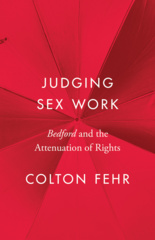
Shortly after the adoption of the Charter of Rights, the Supreme Court began invoking principles of criminal law theory when striking down criminal laws. More recently, it has employed principles of instrumental rationality in doing so. In both cases, the court relies on the concept of “fundamental justice” under section 7 of the Charter as opposed to invoking specifically enumerated rights when striking down criminal laws.
Constitutionalizing Criminal Law calls for an overhaul of the way the Supreme Court of Canada has developed the relationship between criminal and constitutional law. The existence of multiple avenues to constitutionally challenge criminal laws raises several questions: To what extent do the methods of review overlap, giving rise to judicial choice? What are the benefits and detriments of each approach? Do different purposes underlie each set of enumerated rights? Is it useful to preserve more than one rationale for striking down criminal laws? And what lessons can other jurisdictions draw from the Canadian experience?
This book argues that to increase the fairness and legitimacy of judicial review, the court needs to reverse course. Rights decisions should be based on enumerated rights where possible, the principles of instrumental rationality abandoned, and the principles of criminal law theory invoked only when an unjust criminal law cannot otherwise be challenged under the Charter.
Canadian criminal and constitutional law scholars and lawyers, Canadian judges, political scientists, and criminologists alike will find this work compelling, as will an international audience interested in comparative criminal and constitutional law.
This book offers a fresh and important exploration of how criminal law in Canada is now thoroughly constitutionalized and why those interested in criminal law must understand constitutional law, including all of the legal and equality rights.
Constitutionalizing Criminal Law represents one of the most sustained and well-researched criticisms of the manner in which the Supreme Court has developed and deployed its section 7 jurisprudence that I am aware of.
Colton Fehr is an assistant professor in the Faculty of Law at the University of Saskatchewan. His scholarship has appeared in a number of journals, including the Journal of International Criminal Justice, McGill Law Journal, Queen’s Law Journal, University of British Columbia Law Review, Dalhousie Law Journal, Manitoba Law Journal, Alberta Law Review, Saskatchewan Law Review, Canadian Journal of Law and Technology, Canadian Criminal Law Review, and Criminal Law Quarterly.
1 Choosing among Rights
2 Principles of Criminal Law Theory
3 Principles of Instrumental Rationality
4 Enumerated Principles of Criminal Justice
5 A Normative Approach to Constitutionalizing Criminal Law
6 Lessons from the Canadian Experience
Notes; Bibliography; Index








